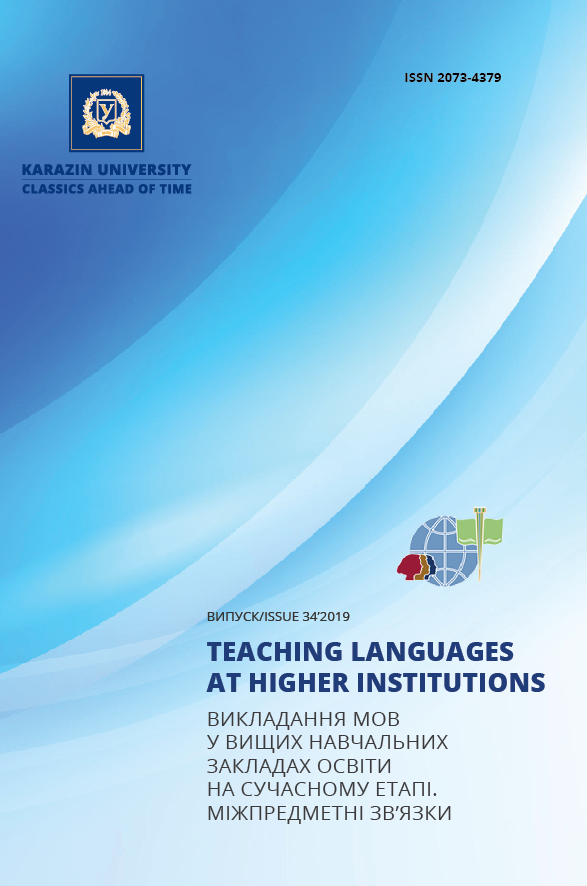Pedagogical grammar as the framework of tefl research. part 6. native language syntax acquisition: yes-no- and wh-questions
Abstract
The paper presents the results of the experimental data analysis in the said sphere, as well as the list of the researched syntactic structures. Basing upon a high degree of the data similarity, the author makes a conclusion that the native language (English) syntax acquisition is a rule-governed process, which might be based upon the operation of language universals. Taking into account the said data, the author also offers some assumptions concerning the existence of a universal sequenceof stages in the process of yes-no- and wh-questions acquisition in English as a native language, as well as regarding the different acquisition models related to different types of wh-questions. The author considers the reasons for the absence of fully inverted structures at the first three stages of the said acquisition within the framework of maturational theories. He also shows the limitations concerning their capability to explain some phenomena observed in real child speech. The paper demonstrates that the child’s speech may simultaneously contain inverted and non-inverted structures of wh-questions and offers its interpretation of this phenomenon. The author examines the possible reasons for the double marking of the auxiliary (link) verb and the grammar tense of the lexical verb. The paper also analyses the role and specifics of copying and erasing operations in generating the wh-questions structures. The author shows the limitations of linguistic rules in the verification of hypotheses concerning the operations that presumably take place in the child’s brain during the said generation. The paper outlines the prospects of further research concerning the development of pedagogical grammar, taking into account the abovementioned conclusions.
Downloads
References
Brown, R. (1973). A First Language: The Early Stages. Cambridge, Mass: Harvard Univ. Press [in English].
Chernovaty, L. (1999). Osnovy teorii pedagogicheskoi grammatiki inostrannogo yazyka [The Basics of the Foreign Language Pedagogical Grammar Theory]. Doctor of Sciences thesis. Kharkiv: V.N. Karazin Kharkiv National University [in Russian].
Chernovaty, L.M. (2016). Pedagogical grammar as the framework of research in teaching foreign languages. Part 1. Levels and types of grammar. Vykladannia mov u vyshchykh navchalnykh zakladakh osvity na suchasnomu etapi. Mizhpredmetni zviazky [Current teaching of languages at higher educational establishments. Interdisciplinary approach], 29, pp. 157–166 [in English].
Chernovaty, L.M. (2017). Pedagogical grammar as the framework of research in teaching foreign languages. Part 2. Native language acquisition: General background. Vykladannia mov u vyshchykh navchalnykh zakladakh osvity na suchasnomu etapi. Mizhpredmetni zviazky [Current teaching of languages at higher educational establishments. Interdisciplinary approach], 30, pp. 156–165 [in English].
Chernovaty, L.M. (2018). Pedagogical grammar as the framework of TEFL research. Part 3. Native language acquisition: strategies, procedures and processes.Theword-combinationstage. Vykladannia mov u vyshchykh navchalnykh zakladakh osvity na suchasnomu etapi. Mizhpredmetni zviazky [Current teaching of languages at higher educational establishments. Interdisciplinary approach], 31, pp. 154–163 [in English].
Chernovaty, L.M. (2018). Pedagogical grammar as the framework of TEFL research. Part 4. Foreign language acquisition: strategies, procedures and processes. Vykladannia mov u vyshchykh navchalnykh zakladakh osvity na suchasnomu etapi. Mizhpredmetni zviazky [Current teaching of languages at higher educational establishments. Interdisciplinary approach], 32, pp. 126–134 [in English].
Chernovaty, L.M. (2019). Pedagogical grammar as the framework of TEFL research. Part 5. Native language acquisition: morphology acquisitionat the simple sentence stage. Vykladannia mov u vyshchykh navchalnykh zakladakh osvity na suchasnomu etapi. Mizhpredmetni zviazky [Current teaching of languages at higher educational establishments. Interdisciplinary approach], 33, pp. 118–126 [in English].
Gass, S.M. and Mackey, A. (Eds.). (2012). The Routledge Handbook of Second Language Acquisition. London: Routledge [in English].
de Villiers, J. and de Villiers, P. (1978) Language Acquisition. Cambridge, Mass.: Harvard Univ. Press [in English].
Erreich, A., Valian V. and Winzemer J. (1980). Aspects of a theory of language acquisition. Journal of Child Language, 2, pp. 157–179 [in English].
Hyeson, P. (2000). When-questions in second language acquisition. Second Language Acquisition. 16 (1), pp. 44–76 [in English].
Ingram, D. (1992). First Language Acquisition. Cambridge: Cambridge Univ. Press [in English].
Kuczaj, S.A. and Maratsos, M. (1975). What children ‘can’ say before they ‘will’. Merrill-Palmer Quarterly of Behavior and Development, 21, pp. 89–111 [in English].
Kuczaj, S.A. and Maratsos, M. (1983). Initial verbs of yes-no questions: a different kind of general grammatical category. Developmental Psychology, 19, pp. 440–444 [in English].
Maratsos, M. and Kuczaj, S.A. (1978). Against the transformational account: a simpler analysis of auxiliary overmarkings. Journal of Child Language, 5, pp. 337–345 [in English].
Rowland, C.F., Pine, J.M., Lieven, E.V. and Theakston, A.L. (2003). Determinants of acquisition order in wh-questions: re-evaluating the role of caregiver speech. Journal of Child Language, 30 (3), pp. 609–635 [in English].

